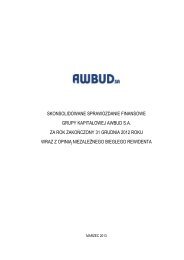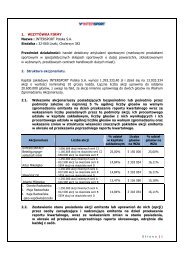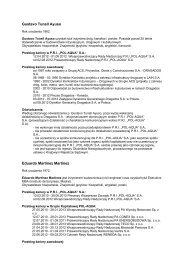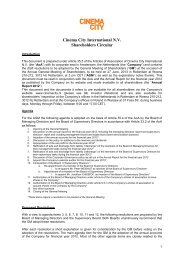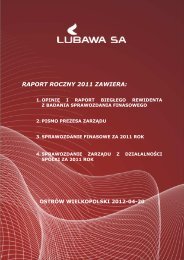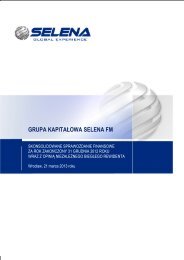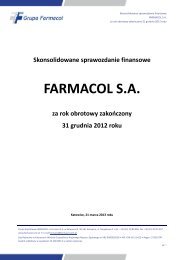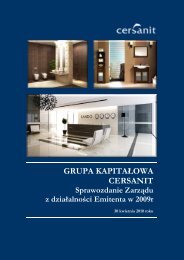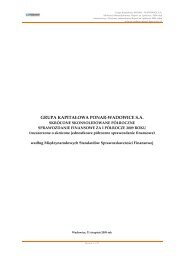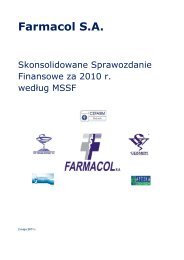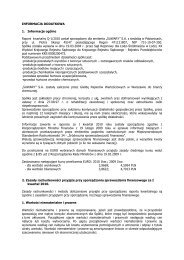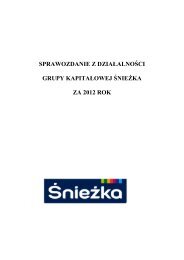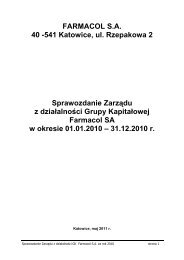- Page 1 and 2:
Prospectus relating to the offer un
- Page 3 and 4:
4.3.3 Risks associated with the per
- Page 5 and 6:
20.4. Audit of annual financial inf
- Page 7 and 8:
6.5 Stabilisation..................
- Page 9 and 10:
Banca dell’Umbria Banca dell’Um
- Page 11 and 12:
Issuer or UniCredit or the Company
- Page 13 and 14:
Germany, and between January 14, 20
- Page 15 and 16:
UniCredit Family Financing Bank Uni
- Page 17 and 18:
CDO Acronym of Collateralized Debt
- Page 19 and 20:
well as the negative “prudential
- Page 21 and 22:
RWA (Risk-weighted asset) Value wei
- Page 23 and 24:
(h) Counterpart risk; (i) Risks ass
- Page 25 and 26:
Since its creation, the Group has c
- Page 27 and 28:
For greater information on the UniC
- Page 29 and 30:
OPERATING PROFIT (millions of €)
- Page 31 and 32:
The members of the Board of Directo
- Page 33 and 34:
Article 2441, first, second and thi
- Page 35 and 36:
− notification that the investor
- Page 37 and 38:
Selected financial information on t
- Page 39 and 40:
• statutory financial statements
- Page 41 and 42:
1. PARTIES RESPONSIBLE 1.1 Parties
- Page 43 and 44:
consolidated interim report as of t
- Page 45 and 46:
The reclassified income statement f
- Page 47 and 48:
Trading, hedging and fair value inc
- Page 49 and 50:
at 12.31.2008 Notional value 28,772
- Page 51 and 52:
4. RISK FACTORS - 51 - RISK FACTORS
- Page 53 and 54:
- 53 - RISK FACTORS Since the finan
- Page 55 and 56:
- 55 - RISK FACTORS 2009 did not em
- Page 57 and 58:
- 57 - RISK FACTORS liquidity facil
- Page 59 and 60:
- 59 - RISK FACTORS which €1,686
- Page 61 and 62:
- 61 - RISK FACTORS Increases in th
- Page 63 and 64:
- 63 - RISK FACTORS Some of the met
- Page 65 and 66:
- 65 - RISK FACTORS Regional Court
- Page 67 and 68:
- 67 - RISK FACTORS Dalmata S.r.l.
- Page 69 and 70:
- 69 - RISK FACTORS • Vanderbilt
- Page 71 and 72:
- 71 - RISK FACTORS It is maintaine
- Page 73 and 74:
- 73 - RISK FACTORS With reference
- Page 75 and 76:
- 75 - RISK FACTORS related supplem
- Page 77 and 78:
- 77 - RISK FACTORS expressly adher
- Page 79 and 80:
4.1.17 Risks associated with activi
- Page 81 and 82:
- 81 - RISK FACTORS The UniCredit G
- Page 83 and 84:
- 83 - RISK FACTORS effects on the
- Page 85 and 86:
- 85 - RISK FACTORS 4.2.5 Risks ass
- Page 87 and 88:
- 87 - RISK FACTORS For further inf
- Page 89 and 90:
5 INFORMATION ON THE COMPANY 5.1. H
- Page 91 and 92:
What is more, in August 2004 Pionee
- Page 93 and 94:
(B) The merger transactions with th
- Page 95 and 96:
Register on September 25, 2007 and
- Page 97 and 98:
December 2007 UniCredit reached an
- Page 99 and 100:
Real Estate subsequently transferre
- Page 101 and 102:
associated with liabilities which a
- Page 103 and 104:
Total 3,781 4,003 4,186 3,086 -5.5%
- Page 105 and 106:
PIRELLI PEKAO REAL ESTATE SP. Z O.O
- Page 107 and 108:
a structure by sector of activities
- Page 109 and 110:
Total 2,680 5,616 5,458 10,510 8,21
- Page 111 and 112:
(ii) credit, debit and prepaid card
- Page 113 and 114:
The CIB business segment focuses on
- Page 115 and 116:
markets and corporate treasury sale
- Page 117 and 118:
econstructed INCOME STATEMENT FIGUR
- Page 119 and 120:
The table below discloses the main
- Page 121 and 122:
For the purposes of assessing the r
- Page 123 and 124:
(the available margin is provided b
- Page 125 and 126:
these shares, provided that the sha
- Page 127 and 128:
and up-dates on the basis of the pr
- Page 129 and 130:
(i) the granting of authorizations
- Page 131 and 132:
- 131 -
- Page 133 and 134:
Private Banking Business Unit (whic
- Page 135 and 136:
Piedmont 466 2,716 17 2 Puglia 173
- Page 137 and 138:
Europe (including Germany and Austr
- Page 139 and 140:
(b) PMI, for corporations with an a
- Page 141 and 142:
With regards to loans 19 , as at Ju
- Page 143 and 144:
and services, combining a unique ge
- Page 145 and 146:
• the guidelines, policies and st
- Page 147 and 148:
countries), with reference to the m
- Page 149 and 150:
• the introduction, within the ne
- Page 151 and 152:
Real estate risk consists of potent
- Page 153 and 154:
7. ORGANISATIONAL STRUCTURE 7.1. Gr
- Page 155 and 156:
- 155 -
- Page 157 and 158:
7.2. Issuer’s subsidiaries The fo
- Page 159 and 160:
NAME REGISTERED OFFICE COUNTRY ACTI
- Page 161 and 162:
NAME ASPRA FINANCE S.P.A. ITALY REG
- Page 163 and 164:
NAME REGISTERED OFFICE COUNTRY PEKA
- Page 165 and 166:
NAME REGISTERED OFFICE COUNTRY ACTI
- Page 167 and 168:
NAME REGISTERED OFFICE COUNTRY UNIC
- Page 169 and 170:
ARGENTAURUS IMMOBILIEN- VERM IETUNG
- Page 171 and 172:
• Tangible assets: breakdown of a
- Page 173 and 174:
The information regarding intangibl
- Page 175 and 176:
Vienna Donau-City Wed Donau - City
- Page 177 and 178:
9. REPORT ON THE OPERATIONAL AND FI
- Page 179 and 180:
slowdown in both German and, more s
- Page 181 and 182:
this Chapter refer to these changes
- Page 183 and 184:
• 2009 − Retail − Corporate &
- Page 185 and 186:
longer intended for trading due to
- Page 187 and 188:
illion, an increase of approximatel
- Page 189 and 190:
REGULATORY CAPITAL 09.30.2009 12.31
- Page 191 and 192:
capital requirements for market ris
- Page 193 and 194:
as per the accounting standards app
- Page 195 and 196:
At the end of 2008, available-for-s
- Page 197 and 198:
Non-financial companies 3,138 1,961
- Page 199 and 200:
and demand deposits 2.2 Time deposi
- Page 201 and 202:
derecognised Total (Carrying value)
- Page 203 and 204:
The coverage ratio (or the ratio be
- Page 205 and 206:
Situation as at 31.12.2007 Notional
- Page 207 and 208:
As at September 30, 2009, similar c
- Page 209 and 210:
In its role as sponsor, the Group s
- Page 211 and 212:
showed a great deal of volatility,
- Page 213 and 214:
The Group does not have any mortgag
- Page 215 and 216:
B.2 Financial assets designated at
- Page 217 and 218:
During Q3 2009, UniCredit Real Esta
- Page 219 and 220:
Total 8,175 8,049 9,105 6,872 1.6%
- Page 221 and 222:
Total interest income is, for the t
- Page 223 and 224:
(millions of €) % Change Fee and
- Page 225 and 226:
Net hedging income (loss) (millions
- Page 227 and 228:
Administrative expenses for personn
- Page 229 and 230:
consolidation were attributable sol
- Page 231 and 232:
The cost of credit risk (calculated
- Page 233 and 234:
eing completed on October 1, 2007.
- Page 235 and 236:
and Romania). Growth in the Poland
- Page 237 and 238:
( in millions of Euros) % Change Ne
- Page 239 and 240:
markets recorded in 2007 (Croatia,
- Page 241 and 242:
Gross profit therefore stands at
- Page 243 and 244:
amounting to € 1,222 million in a
- Page 245 and 246:
1. Deposits from banks 152,437 1,94
- Page 247 and 248:
usiness segments have posted result
- Page 249 and 250:
(in millions of €) % Change Opera
- Page 251 and 252:
(in millions of €) RECONCILIATION
- Page 253 and 254:
100. Income (Losses) from sale or r
- Page 255 and 256:
100. Income (Losses) from sale or r
- Page 257 and 258:
This result should not be considere
- Page 259 and 260:
10.2. Information regarding the fin
- Page 261 and 262:
5.00% 02.01.2016 applicable not app
- Page 263 and 264:
HVB Lux Geldilux - TS - 2005 tradit
- Page 265 and 266:
10.3. Indication of the financial r
- Page 267 and 268:
12. INFORMATION ON EXPECTED TRENDS
- Page 269 and 270:
14. ADMINISTRATION, MANAGEMENT OR S
- Page 271 and 272:
Quadrante Europa (Platform for logi
- Page 273 and 274:
esearch on the strategies of multin
- Page 275 and 276:
Director; he is a Member of the Boa
- Page 277 and 278:
the Management Board of Bank Austri
- Page 279 and 280:
Alessandro Profumo Giovanni Belluzz
- Page 281 and 282:
Manfred Bischoff Enrico Tommaso Cuc
- Page 283 and 284:
Donato Fontanesi Francesco Giacomin
- Page 285 and 286:
Marianna Li Calzi Salvatore Ligrest
- Page 287 and 288:
Banca SANPAOLO IMI S.p.A. Member of
- Page 289 and 290:
Mischek Privatstiftung Member of th
- Page 291 and 292:
The members of the Board of Statuto
- Page 293 and 294:
Massimo Livatino. Degree in Economi
- Page 295 and 296:
CSP Società Consortile a r.l. Chai
- Page 297 and 298:
Giuseppe Verrascina Interpump Group
- Page 299 and 300:
Eastern Europe. In November 2001 he
- Page 301 and 302:
Group and merger with the Capitalia
- Page 303 and 304:
Reninvest SA Member of the Board of
- Page 305 and 306:
Fondazione Ugo Foscolo (UniCredit &
- Page 307 and 308:
- on the Warsaw Stock Exchange in r
- Page 309 and 310:
Person Position description Compens
- Page 311 and 312:
Person Position description Compens
- Page 313 and 314:
Other key management personnel, lis
- Page 315 and 316:
Friedrich Kadrnoska Director April
- Page 317 and 318:
External Auditors, as well as the s
- Page 319 and 320:
- put in place a set of regulations
- Page 321 and 322:
1 shares received in 2009 following
- Page 323 and 324:
(c) “Discount Share”: at the en
- Page 325 and 326:
subsidiaries - direct or indirect -
- Page 327 and 328:
For that which concerns the informa
- Page 329 and 330:
customers Other assets 45 - 16 - -
- Page 331 and 332:
The following table provides detail
- Page 333 and 334:
November 2008 December 2008 January
- Page 335 and 336:
20. FINANCIAL INFORMATION REGARDING
- Page 337 and 338:
Balance Sheet In the following tabl
- Page 339 and 340:
A. 1. OPERATING ACTIVITIES Operatio
- Page 341 and 342:
On April 30, 2009, the ordinary ses
- Page 343 and 344:
losses in the matter or, if this pe
- Page 345 and 346:
International Industrial Participat
- Page 347 and 348:
debited to the plaintiff’s accoun
- Page 349 and 350:
Accordingly, the plaintiff requeste
- Page 351 and 352:
Zagrebačka maintains that the plai
- Page 353 and 354:
In fact, the bank believes it has c
- Page 355 and 356:
In the meantime, HVB, which believe
- Page 357 and 358:
Madoff In December 2008, Bernard L.
- Page 359 and 360:
standards, no provisions were made
- Page 361 and 362:
Investigations by the Polish Tax Au
- Page 363 and 364:
In addition, BiFin conducted an ins
- Page 365 and 366:
21. ADDITIONAL INFORMATION 21.1. Eq
- Page 367 and 368:
The Board of Directors resolved: i)
- Page 369 and 370:
medium-term incentive system for Gr
- Page 371 and 372:
09.18.2008 September 16, 2008 6,683
- Page 373 and 374:
01.04.2008 December 31, 2007 6,682,
- Page 375 and 376:
10.02.2006 September 15, 2006 5,218
- Page 377 and 378:
Only shareholders that individually
- Page 379 and 380:
financial or insurance sectors, in
- Page 381 and 382:
Pursuant to Section 27 of the Artic
- Page 383 and 384:
Additionally, the Shareholders’ M
- Page 385 and 386:
If these provisions are violated, a
- Page 387 and 388:
the interest held by UniCredit in B
- Page 389 and 390:
22.7. Agreement for the sale by BA
- Page 391 and 392:
First Contribution, shares of the O
- Page 393 and 394:
23. INFORMATION ORIGINATING FROM TH
- Page 395 and 396:
25. INFORMATION ON EQUITY INVESTMEN
- Page 397 and 398:
S. NAME MEDIOBANCA BANCA DI CREDITO
- Page 399 and 400:
List of the Main Companies Subject
- Page 401 and 402:
SECOND SECTION - 401 -
- Page 403 and 404:
2. RISK FACTORS For a description o
- Page 405 and 406:
3.4 Reasons for the Offer and Use o
- Page 407 and 408:
With reference to the voting right,
- Page 409 and 410:
Some general information about the
- Page 411 and 412:
esolution following the one pertain
- Page 413 and 414:
shareholders, and the companies and
- Page 415 and 416:
Non Qualifying Holdings contribute
- Page 417 and 418:
Capital gains realised by resident
- Page 419 and 420:
4.11.2 Germany The following sectio
- Page 421 and 422:
and is an employee of the Company.
- Page 423 and 424:
Shares acquired before December 31,
- Page 425 and 426:
deducted to the extent to which the
- Page 427 and 428:
4.11.3 Poland The following summary
- Page 429 and 430:
In order to eliminate the double ta
- Page 431 and 432:
are subject to taxation on the disp
- Page 433 and 434:
donation or the acceptance of inher
- Page 435 and 436:
ending dates, by submitting a reque
- Page 437 and 438:
The Shares subscribed before the en
- Page 439 and 440:
and Australia, and in the other Exc
- Page 441 and 442:
€135,000,000, then extended to
- Page 443 and 444:
6. ADMISSION TO TRADING AND TRADING
- Page 445 and 446:
8. EXPENSES LINKED TO THE OFFER 8.1
- Page 447 and 448:
10. ADDITIONAL INFORMATION 10.1 Con
- Page 449 and 450:
Consolidated Interim Report as at S
- Page 451:
3 Consolidated Interim Report as at
- Page 455 and 456:
Contents 7 Consolidated Interim Rep
- Page 457 and 458:
Changes made to enable proper compa
- Page 459 and 460:
11 >> Consolidated Interim Report T
- Page 461 and 462:
Notes 13 Interim Report on Operatio
- Page 463 and 464:
Highlights 15 >> Interim Report on
- Page 465 and 466: 17 >> Interim Report on Operations
- Page 467 and 468: 19 >> Interim Report on Operations
- Page 469 and 470: Results by Business Segment 21 >> I
- Page 471 and 472: UniCredit Share SHARE INFORMATION S
- Page 473 and 474: 25 >> Interim Reports on Operations
- Page 475 and 476: 27 >> Interim Reports on Operations
- Page 477 and 478: Operating Profit Breakdown 29 >> In
- Page 479 and 480: Non-Interest Income 31 >> Interim R
- Page 481 and 482: Net Profit attributable to the Grou
- Page 483 and 484: Profit before Taxes 35 >> Interim R
- Page 485 and 486: Capital Ratios 37 >> Interim Report
- Page 487 and 488: 39 >> Interim Report on Operations
- Page 489 and 490: Risks connected with raising funds
- Page 491 and 492: Retail Introduction 43 >> Group Res
- Page 493 and 494: 45 >> Group Results Retail Retail p
- Page 495 and 496: 47 >> Group Results Retail The SRT
- Page 497 and 498: Retail Network Austria 49 >> Group
- Page 499 and 500: Asset Gathering 51 >> Group Results
- Page 501 and 502: 53 >> Group Results Corporate & Inv
- Page 503 and 504: Strategies and Product Lines Financ
- Page 505 and 506: 57 >> Group Results Corporate & Inv
- Page 507 and 508: 59 >> Group Results Private Banking
- Page 509 and 510: 61 >> Group Results Private Banking
- Page 511 and 512: It is not currently possible to est
- Page 513 and 514: 65 >> Group Results Asset Managemen
- Page 515: 67 >> Group Results Central Eastern
- Page 519 and 520: 71 >> Group Results Central Eastern
- Page 521 and 522: 73 >> Group Results Poland’s Mark
- Page 523 and 524: Further Information 75 >> Group Res
- Page 525 and 526: 77 >> Group Results The combination
- Page 527 and 528: New Group external growth initiativ
- Page 529 and 530: Transactions to dispose of equity i
- Page 531 and 532: Steps to Strengthen Capital 83 >> G
- Page 533: Outlook 85 >> Group Results Despite
- Page 537 and 538: 89 RELASEMESTRALE CONSOLIDATA >> Co
- Page 539 and 540: Liabilities and shareholders' equit
- Page 541 and 542: 93 RELASEMESTRALE CONSOLIDATA >> Co
- Page 543 and 544: 95 RELASEMESTRALE CONSOLIDATA >> Co
- Page 545: CONSOLIDATED CASH FLOW STATEMENT (i
- Page 548 and 549: 100
- Page 550 and 551: Part A) Accounting Policies A1) Gen
- Page 552 and 553: Section 3 - Consolidation Scope and
- Page 554 and 555: Investments in subsidiaries, compan
- Page 556 and 557: NAME MAIN OFFICE CONSOLIDATED INTER
- Page 558 and 559: NAME MAIN OFFICE CONSOLIDATED INTER
- Page 560 and 561: NAME MAIN OFFICE DELPHA IMMOBILIEN-
- Page 562 and 563: NAME MAIN OFFICE GRUNDSTUCKSAKTIENG
- Page 564 and 565: NAME MAIN OFFICE CONSOLIDATED INTER
- Page 566 and 567:
NAME MAIN OFFICE CONSOLIDATED INTER
- Page 568 and 569:
NAME MAIN OFFICE CONSOLIDATED INTER
- Page 570 and 571:
NAME MAIN OFFICE CONSOLIDATED INTER
- Page 572 and 573:
NAME MAIN OFFICE CONSOLIDATED INTER
- Page 574 and 575:
NAME MAIN OFFICE CONSOLIDATED INTER
- Page 576 and 577:
NAME MAIN OFFICE CONSOLIDATED INTER
- Page 578 and 579:
NAME MAIN OFFICE CONSOLIDATED INTER
- Page 580 and 581:
NAME MAIN OFFICE CONSOLIDATED INTER
- Page 582 and 583:
Section 4 - Subsequent Events No ev
- Page 584 and 585:
136
- Page 586 and 587:
Part B) Consolidated Balance Sheet
- Page 588 and 589:
Section 5 - Held-to-maturity invest
- Page 590 and 591:
Section 12 - Property, plant and eq
- Page 592 and 593:
The CGU is the lowest level at whic
- Page 594 and 595:
Section 15 - Non-current assets and
- Page 596 and 597:
Section 3 - Debt securities in issu
- Page 598 and 599:
Section 15 - Shareholders’ Equity
- Page 600 and 601:
152
- Page 602 and 603:
Part C) - Consolidated Income State
- Page 604 and 605:
Section 3 - Dividend income and sim
- Page 606 and 607:
Section 8 - Impairment losses - Ite
- Page 608 and 609:
Section 12 - Provisions for risks a
- Page 610 and 611:
162
- Page 612 and 613:
Part D - Segment Reporting (amounts
- Page 614 and 615:
A - Primary Segment Segment Reporti
- Page 616 and 617:
168
- Page 618 and 619:
Part E - Risks ad related risk mana
- Page 620 and 621:
Quantitative Information A. Credit
- Page 622 and 623:
A.1.3 Balance sheet exposure to ban
- Page 624 and 625:
Information on Structured Credit Pr
- Page 626 and 627:
Retention by the Group of the first
- Page 628 and 629:
Securitized assets broken down by a
- Page 630 and 631:
The following table shows exposure
- Page 632 and 633:
The residual life of sponsored cond
- Page 634 and 635:
Structured credit product exposures
- Page 636 and 637:
The Group’s portfolio includes th
- Page 638 and 639:
A financial instrument is regarded
- Page 640 and 641:
The following table gives the amoun
- Page 642 and 643:
Here follows the breakdown of balan
- Page 644 and 645:
The following graphs analyze the ba
- Page 646 and 647:
Currently, clockwise and counter-cl
- Page 648 and 649:
Sensitivity to the volatility of in
- Page 650 and 651:
Section 3 - Liquidity risk Managing
- Page 652 and 653:
Organizational structure Senior Man
- Page 654 and 655:
B. Legal Risks There are a number o
- Page 656 and 657:
Cirio In April 2004 the Extraordina
- Page 658 and 659:
Divania S.r.l In the first half of
- Page 660 and 661:
Mario Malavolta On July 2009 Mr. Ma
- Page 662 and 663:
Hypo Real Estate AG and Hypo Real E
- Page 664 and 665:
Squeeze-out of minority shareholder
- Page 666 and 667:
In addition, several proceedings ha
- Page 668 and 669:
220
- Page 670 and 671:
Part F - Information on Shareholder
- Page 672 and 673:
Section 2 - Shareholders’ equity
- Page 674 and 675:
B. Quantitative information Regulat
- Page 676 and 677:
228
- Page 678 and 679:
Part H - Related-party transactions
- Page 680 and 681:
232
- Page 682 and 683:
Part I) Share-Based Payments A. Qua
- Page 684 and 685:
236
- Page 686 and 687:
Annex 1 - Reconciliation of Condens
- Page 688 and 689:
CONSOLIDATED INCOME STATEMENT (€
- Page 690 and 691:
Annex 2 - Definition of Terms and A
- Page 692 and 693:
- Pillar 1: while the objective of
- Page 694 and 695:
Cost of risk The ratio between loan
- Page 696 and 697:
Hedge Fund Speculative mutual inves
- Page 698 and 699:
Liquidity risk The risk of the comp
- Page 700 and 701:
Purchase Companies Vehicle used by
- Page 702 and 703:
UCITS - Undertaking for Collective
- Page 704 and 705:
256
- Page 706 and 707:
258
- Page 708:
260



